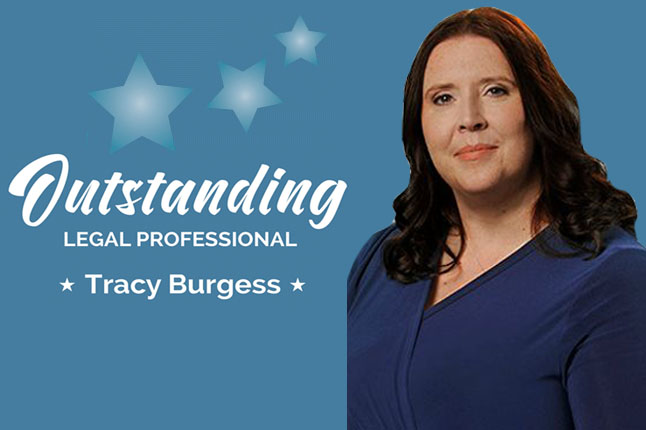
Family law cases require a unique sensitivity and compassion to handle: Divorce and custody matters are often clients’ first or only involvement in the court system and represent one of the worst times in their lives.
Tracy Burgess, an advanced certified senior paralegal at Griffiths Law, has been a paralegal for 20 years, so she’s developed these skills for deftness and delicacy with clients. And she’s often a client’s first point of contact for their case — even before they meet their attorney. She has to give the client a positive impression from the start so they feel comfortable enough to want to work with the firm. Burgess added she tends to then pick back up the relationship with the client after they have an initial consultation with their lawyer.
To help put clients at ease, Burgess is open about sharing with clients that she has gone through a divorce herself.
“I definitely say, I understand what you’re going through. It does get better,” she said. “I felt like it made me a better paralegal going through that because I did completely understand what they were going through at that point.”
Burgess said she has developed a few other different strategies for making clients feel comfortable. She keeps in mind that parts of the legal process that are routine to her are unfamiliar and can be daunting to clients.
Burgess also sees value to clients in staying well organized. She said she suggests to clients that they write down any questions they have for their attorney when they get ready to meet with them.
“I know that sounds like a simple piece of advice, but I know when I get in a meeting, I sometimes forget things that I wanted to ask,” she said. “So it’s very important to me to get your questions answered when you’re meeting with an attorney.”

She doesn’t underestimate the role of organization in setting up a case and said it’s key for a person to make sure their organization method fits with their style of working. “Everything flows from that as far as organizing deadlines, organizing the way the case flows, just organizing the mountains of paper we receive every day,” she said. “If you walked around our office, you would see some paralegals have things piled everywhere, but their system works for them.”
Burgess has spent six years at Griffiths Law: First from 2006 to 2010, and she returned to the firm in 2018. She specifically works for senior counsel Leslie Hansen.
In her role, Burgess can do just about everything “but go to court and provide legal advice. Along with handling case management tasks such as docketing and making sure deadlines get met, she also drafts documents, talks to witnesses and keeps clients up to date. She said with her experience she can mentor the firm’s younger paralegals and associate attorneys.
“I definitely think our associate attorneys do look to our senior paralegals, including myself, for information on processes when they’re still learning how things work and things that we’ve done before.”
Burgess has had an interest in the legal field since childhood, but said she realized courtroom work wouldn’t suit her, and she’s happy having a behind-the-scenes role. She said she takes pride in her ability to help people when they are going through their worst times.
“I think a lot of it had to do with my childhood and just growing up with divorced parents. So it doesn’t surprise me at all that I ended up in this field.”
—Julia Cardi

